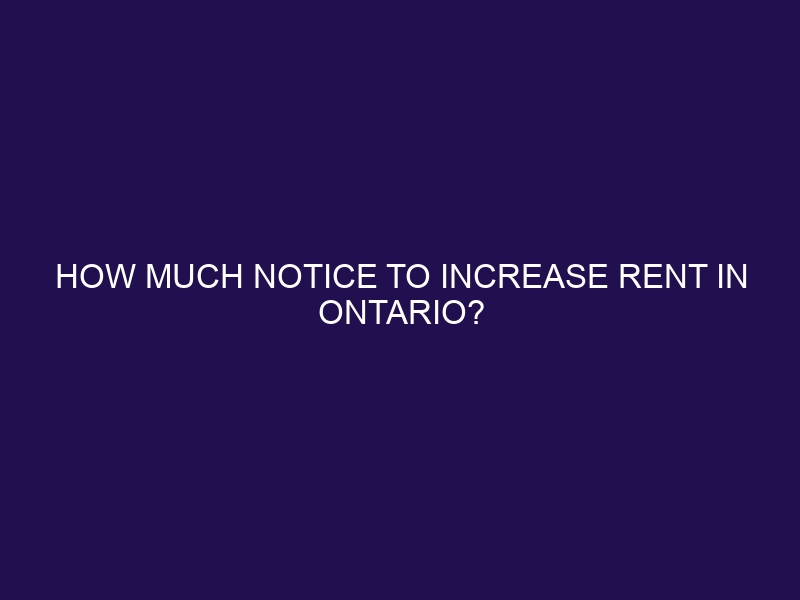How much notice to increase rent in Ontario?
.jpg)
Understanding Rent Increase Laws in Ontario is crucial for landlords and tenants alike. Ontario has specific regulations in place to govern rent increases to ensure fair and reasonable practices. Familiarizing yourself with these laws will help you navigate the process smoothly.
According to the Residential Tenancies Act, landlords in Ontario are permitted to increase rent, but there are specific guidelines to follow. The Act outlines the frequency with which rent can be increased and specifies the maximum percentage increase allowed.
Factors such as economic conditions, market trends, and the relationship with tenants should be considered before deciding to increase rent. These factors play a significant role in determining the feasibility and fairness of a rent increase.
When it comes to providing notice to increase rent, there are specific requirements that landlords must follow. The notice period and the information that should be included in the notice are regulated to protect tenant rights and ensure transparency in the process.
In the event that a tenant objects to a proposed rent increase, it is essential to understand their rights and the options available to challenge the increase.
By understanding the rent increase laws in Ontario, landlords can navigate the process in a compliant manner, and tenants can be aware of their rights and options. This article will delve into the details of Ontario’s rent increase laws, the factors to consider before increasing rent, providing notice, and the procedures for dealing with objections from tenants.
Key Takeaways:
- Rent Increase Laws in Ontario: Landlords must abide by specific regulations when increasing rent, including providing proper notice to tenants.
- Notice Period for Rent Increases: In Ontario, landlords must give tenants at least 90 days’ written notice before raising the rent.
- Contents of a Rent Increase Notice: A notice of rent increase must include the date of the notice, the new rent amount, the effective date of the increase, and a statement informing tenants of their right to challenge the increase.
Understanding Rent Increase Laws in Ontario
In Ontario, understanding the rent increase laws is crucial to ensure compliance and protect the rights of tenants and landlords. Here are key points to consider in understanding rent increase laws in Ontario:
| – Rent increase notice: | Landlords must provide written notice at least 90 days before increasing the rent. |
|---|---|
| – Legal limit: | There are annual limits to how much landlords can increase rent, which is typically set by the government. |
| – Guidelines: | The Residential Tenancies Act provides detailed guidelines on rent increase rules, exemptions, and dispute resolution processes. |
| – Tenant rights: | Tenants have the right to challenge rent increases if they believe they are unfair or not in accordance with the law. |
It is important for both landlords and tenants to have a clear understanding of these laws in order to maintain a fair and harmonious rental relationship in Ontario.
What Do Ontario Rent Increase Laws State?
What Do Ontario Rent Increase Laws State?
Ontario rent increase laws in Canada state that landlords can only raise the rent once every 12 months for existing tenants. The maximum percentage increase allowed for rent in Ontario is determined annually by the government’s Rent Increase Guideline. This guideline is based on the Consumer Price Index and can vary from year to year. Before increasing rent, landlords should consider economic factors, market conditions, and their relationship with tenants. When providing notice of a rent increase, landlords must give at least 90 days notice in writing, including the amount of the increase and the date it will take effect. Tenants have the right to challenge a rent increase if they believe it is above the guideline.
How Often Can Rent Be Increased in Ontario?
In Ontario, landlords can increase rent once every 12 months, as per the Residential Tenancies Act.
This regulation ensures that tenants have some stability in their housing costs. Landlords must also provide proper notice to tenants before increasing rent. This notice period is typically 90 days, but it can be longer if the increase is higher than the guideline amount set by the government annually.
It’s important for landlords to understand and comply with these regulations to maintain a positive relationship with their tenants.
How Often Can Rent Be Increased in Ontario?
What is the Maximum Percentage Increase Allowed for Rent in Ontario?
What is the Maximum Percentage Increase Allowed for Rent in Ontario?
The government annually determines the maximum percentage increase allowed for rent in Ontario. As of 2021, the guideline increase for rent is capped at 1.2%. Landlords must adhere to this percentage and cannot exceed it unless granted approval by the Landlord and Tenant Board for specific reasons. The intention behind this guideline is to ensure that rent increases for tenants remain fair and reasonable. To avoid any violations or disputes with tenants, it is crucial for landlords to stay informed about the current maximum percentage increase permitted for rent in Ontario.
Here’s a pro-tip: Landlords should always review and follow the current rental guidelines established by the government to ensure compliance and maintain a positive relationship with their tenants.
Factors to Consider Before Increasing Rent
When it comes to increasing rent in Ontario, there are several key factors that landlords must carefully consider. In this section, we’ll explore these factors in detail, providing valuable insights and tips along the way. From economic factors that impact rental prices to the current market conditions landlords should be aware of, and even the significance of building positive relationships with tenants – we’ll cover it all. So, let’s dive in and make informed decisions about rent increases in Ontario.
Economic Factors
Economic factors play a crucial role in determining whether a landlord can increase rent. Some important economic factors to consider are:
1. Inflation: Landlords may increase rent to keep up with rising inflation rates, ensuring their rental income maintains its value over time.
2. Cost of Living: High living costs, such as increased property taxes, maintenance fees, or utility expenses, can justify rent increases to cover these additional expenses.
3. Property Expenses: If the landlord has made significant improvements or renovations to the rental property, they may need to raise rents to recover their investment.
| Economic Factors | Description |
|---|---|
| Inflation | Adjusting rent based on the rise in prices of goods and services. |
| Cost of Living | Increasing rent to cover the growing expenses associated with living. |
| Property Expenses | Raising rent due to significant investments in the rental property. |
In my city, the cost of living has been steadily increasing due to strong economic growth. As a result, landlords have been raising rents to keep up with the rising expenses. One landlord, who had recently upgraded the heating system in his building to provide better energy efficiency for tenants, decided to increase the rents to help cover the costs of the improvement. While some tenants were initially concerned about the rent increase, they understood the economic factors at play and agreed that the improvement was ultimately beneficial for them.
Market Conditions
When considering increasing rent in Ontario, it is crucial to take market conditions into account. Factors such as supply and demand, vacancy rates, and economic indicators can significantly influence how much landlords can raise rent. If the rental market is highly competitive with substantial demand and low vacancies, landlords may have a greater opportunity to increase rent. On the other hand, if the market is flooded with available rentals, landlords should exercise caution when it comes to rent increases. Staying informed about market conditions will enable landlords to make well-informed decisions and ensure compliance with the legal limits for rent increases in Ontario.
Relationship with Tenants
Maintaining a positive relationship with tenants is crucial for Ontario landlords when considering rent increases. Effective communication is key. Landlords should regularly communicate with tenants to address any concerns or issues they may have. Additionally, it is important to be open and transparent about the reasons for the rent increase. This includes explaining rising property taxes or maintenance costs.
In order to minimize conflict and maintain tenant satisfaction, landlords should also consider flexibility. Rather than immediately implementing a rent increase, alternatives can be explored. This may involve negotiating longer lease terms or offering improvements to the rental property. By ensuring that the proposed rent increase is reasonable and in line with market rates for similar properties in the area, fairness is achieved.
By fostering a positive relationship with tenants and incorporating these principles of transparency, fairness, and flexibility, landlords can navigate rent increases successfully.
Providing Notice to Increase Rent
When it comes to providing notice to increase rent in Ontario, landlords must follow specific steps to ensure compliance with the law.
- Review the current rental agreement to determine the rules and regulations regarding rent increases.
- Provide written notice to the tenant at least 90 days before the proposed increase.
- Include the new rent amount and the effective date of the increase in the notice.
- Ensure that the notice is served properly, either in person or by registered mail.
- Keep a record of the notice and any evidence of service in case of future disputes.
Fact: In Ontario, landlords are required to provide notice of rent increases in accordance with the Residential Tenancies Act.
How Much Notice Is Required to Increase Rent in Ontario?
How Much Notice Is Required to Increase Rent in Ontario?
In Ontario, landlords are required to provide a specific amount of notice before increasing rent. The Residential Tenancies Act states that landlords must give tenants at least 90 days’ written notice of a rent increase. This notice should include the date the increase will take effect and the new rent amount. Landlords must ensure that the notice is served properly, either by delivering it in person, sending it via registered mail, or posting it to the tenant’s unit. It is important for landlords to follow these notice requirements to comply with the law and maintain a good relationship with their tenants.
What Should Be Included in a Notice of Rent Increase?
When issuing a notice of rent increase in Ontario, it is important to include specific information to comply with the law and ensure clear communication with tenants.
What Should Be Included in a Notice of Rent Increase? The notice should include details such as the landlord’s name and contact information, the tenant’s name and address, the current rent amount, the proposed rent increase amount, the effective date of the increase, and the reason for the increase. It is recommended to provide a brief explanation of the tenant’s rights in relation to rent increases and any relevant information on how to challenge the increase if needed. By including this information, landlords can maintain transparency and adherence to the rent increase laws in Ontario.
Dealing with Tenant Objections
When it comes to dealing with tenant objections, it’s important to be well-informed about tenant rights in Ontario. In this section, we’ll dive into the ins and outs of these rights, empowering you with the knowledge to handle any objections that may arise. We’ll explore the process of challenging a rent increase, offering valuable insights and strategies to navigate this complex situation. Stay tuned for invaluable information that will help you navigate the world of tenant objections with confidence!
Tenant Rights in Ontario
Tenant Rights in Ontario
In Ontario, tenant rights are extensively outlined in the Residential Tenancies Act. These rights are meant to ensure a safe and habitable living environment for tenants. It is crucial for both landlords and tenants to be aware of and respect these rights in order to maintain a harmonious landlord-tenant relationship.
One of the key tenant rights in Ontario is the right to a safe and habitable living environment. This means that landlords are responsible for maintaining the property and ensuring that it meets health and safety standards.
Additionally, tenants in Ontario have the right to protection against illegal eviction. Landlords cannot evict a tenant without following the proper legal processes outlined in the Residential Tenancies Act.
Furthermore, tenants also have the right to be informed about any changes to their rent. If a landlord wants to increase the rent, they must provide proper notice to the tenant and follow the guidelines set forth in the act. Tenants have the option to challenge a rent increase if they believe it to be unfair or unreasonable.
If a tenant believes that their rights are being infringed upon, they have the option to take legal action. This may involve challenging a rent increase or pursuing other remedies available under the Residential Tenancies Act.
Overall, it is essential for both landlords and tenants in Ontario to understand and respect tenant rights. By doing so, they can maintain a healthy and harmonious landlord-tenant relationship.
Challenging a Rent Increase
Challenging a Rent Increase in Ontario can be a complex process, but it’s crucial to familiarize yourself with your rights as a tenant. Here are the steps you can take to effectively challenge a rent increase:
- Thoroughly review the rent increase notice to ensure it complies with Ontario’s rent increase laws.
- Confirm whether your unit falls under rent control regulations, as the rent increase must adhere to specific criteria in such cases.
- Conduct market research to determine if the proposed increase aligns with the current rental rates in your area and is reasonable.
- Maintain a record of any maintenance issues or problems with the unit that may impact its value. Present this evidence to your landlord to support your case.
- Initiate communication with your landlord to express your concerns and engage in negotiations to reach a fair resolution.
- If negotiations prove unsuccessful, file a complaint with the Landlord and Tenant Board and request a hearing.
- Compile any supporting evidence, such as photographs, emails, or witness testimonies, to present during the hearing.
- Present your case to the Landlord and Tenant Board, providing detailed explanations as to why you believe the rent increase is unjustified.
- Wait for the board’s decision. If they deem the increase unfair, the board may adjust or cancel the rent increase.
- If you believe your tenant rights have been violated, consider seeking legal advice for further assistance.
Some Facts About How Much Notice to Increase Rent in Ontario:
- ✅ Landlords in Ontario can only increase rent once every 12 months. (Source: Our Team)
- ✅ Ontario landlords must provide written notice at least 90 days in advance of a rent increase. (Source: Our Team)
- ✅ There is no maximum limit on the rent that landlords can charge in Ontario, except for non-profit housing and some student housing. (Source: Our Team)
- ✅ Ontario has rent control, except for newer buildings that are not subject to the same guidelines. (Source: Our Team)
- ✅ After the first 12 months of a lease, landlords can only increase rent by a limited percentage based on yearly guideline limits set by the Ontario Ministry of Municipal Affairs and Housing. (Source: Our Team)
Frequently Asked Questions
How much notice does a landlord have to give to increase rent in Ontario?
In Ontario, landlords are required to provide written notice at least 90 days in advance to increase the rent.
Are there any restrictions on how often a landlord can increase the rent in Ontario?
Yes, landlords in Ontario can only increase the rent once every 12 months.
What is the maximum percentage by which a landlord can increase the rent in Ontario?
For recent years, the maximum increase percentages set by the Ontario Ministry of Municipal Affairs and Housing are: 0% in 2021, 1.2% in 2022, and 2.5% in 2023.
Are there any exceptions to the rent increase guidelines in Ontario?
Yes, landlords can apply to the Landlord and Tenant Board for approval to raise rent above the guideline limits in certain cases, such as large repairs or security system installations.
Does the rent increase guideline apply to all residential rental units in Ontario?
No, the rent increase guideline applies to most private residential rental units, including houses, apartments, condos, care homes, mobile homes, and land lease communities. However, it does not apply to new buildings, new basement apartments occupied for the first time after November 15, 2018, community housing units, long-term care homes, and commercial properties.
Can tenants dispute a rent increase in Ontario?
Yes, tenants can dispute a rent increase if the proper notice is not given or if the increase is deemed improper. They can do so at the Landlord and Tenant Board within 12 months.







